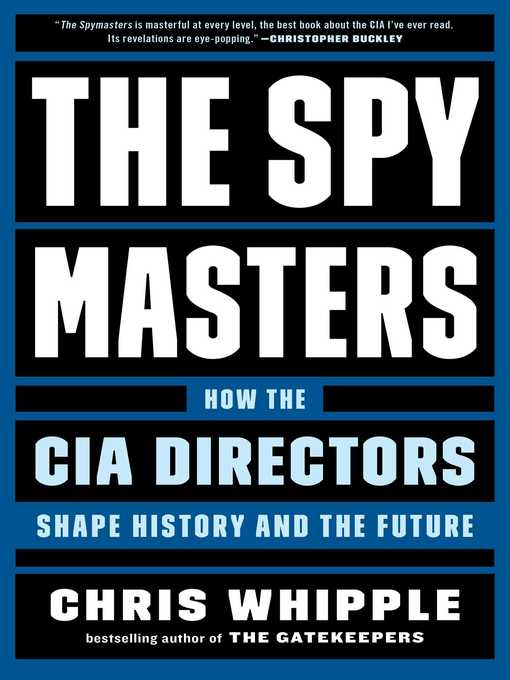
The Spymasters
How the CIA Directors Shape History and the Future
کتاب های مرتبط
- اطلاعات
- نقد و بررسی
- دیدگاه کاربران
نقد و بررسی

An expert chronicle of the CIA through the actions of its directors. Focusing on individual personalities allows Whipple, a Peabody- and Emmy-winning TV producer, to describe the influence they exerted over American's intelligence establishment. He explains that the CIA mainly consists of "two camps." Analysts gather information on other nations, sometimes through spies but often by simply reading their newspapers. Their information is usually accurate, if often ignored; pressed to "predict the future," they obey, but, of course, they "aren't perfect and they often pay the price." In the second camp are operatives, who "practice deception and seduction, enticing strangers to betray their countries." Whipple emphasizes that the CIA serves presidents who may ask for the impossible or the illegal, take credit for successes, and shift blame for failures. Thus, it's accepted that 9/11 took the agency by surprise, although the author rightly points out that administration officials repeatedly ignored warnings of an imminent attack. Directors range from experienced intelligence officers to clueless politicos, technocrats, and ruthless zealots. Richard Helms spoke truth to power, warning Lyndon Johnson and Richard Nixon that North Vietnam wasn't weakening, and then blotted his escutcheon by agreeing to spy on anti-war protesters. Allen Dulles thrilled Dwight Eisenhower by overthrowing supposedly hostile governments in Iran and Guatemala but then oversaw the disastrous invasion of Castro's Cuba. William Casey greased the wheels of the Iran-Contra affair, which "almost sank Ronald Reagan's presidency." The best--according to Whipple: Leon Panetta, William Webster, Robert Gates, John Brennan--have been close to presidents but never partisan. Tim Weiner's Legacy of Ashes remains the best book about the CIA, but readers will not regret time spent on this readable journalistic account, which relies heavily on interviews with living directors and a surprisingly large number of surviving spouses, children, and associates. This lively, opinionated history makes it clear that presidents and CIA directors sometimes deserve each other.
COPYRIGHT(2020) Kirkus Reviews, ALL RIGHTS RESERVED. (Online Review)

May 4, 2020
Former 60 Minutes producer Whipple (The Gatekeepers) delivers a well-documented look at the job of the CIA director, “the person who must tell the president what he doesn’t want to hear.” Opening in 2016, when CIA chief John Brennan learned of Russian efforts to influence the presidential election, Whipple examines the inherent conflict between the agency’s role in gathering and analyzing intelligence and the political nature of the director’s job. He compares Richard Nixon’s attempts to obstruct the Watergate inquiry by claiming it was a covert CIA operation to Donald Trump’s conflicts with intelligence agencies; describes the different managerial styles of directors he’s interviewed, including George Tenet and Leon Panetta; and details notable CIA operations from the 1960s through today. Though unsparing in his appraisal of intelligence community failures, such as not anticipating the fall of the Shah in Iran and allowing Aldrich Ames to funnel secrets to the Soviet Union, Whipple disputes the “notion that the CIA has bungled its way through the last fifty years.” His suggested reforms for improving CIA performance include a fixed 10-year term for directors (as is the case in the FBI), and strengthening whistleblower protections. Whipple makes excellent use of insider accounts and provides enough color to keep readers turning the pages. This well-written and accessible survey illuminates a neglected role in American history. Agent: Lisa Queen, the Queen Literary Agency.

August 14, 2020
Award-winning journalist Whipple (The Gatekeepers) brings his insight on White House foreign relations to this overview of the CIA and its chief director position. Whipple describes how the agency was founded in 1947, as a successor to the Office of Strategic Services, in order to collect, analyze, and present factual evidence, as far as possible, to the U.S. president. The author notes how this created a continuing problem for agency directors pressured to produce analysis that supports what the president they serve wishes to achieve. During his research, Whipple had access to nearly every living CIA director, as well as some of their spouses. Along with profiling each director, from Richard Helms to Gina Haspel, the author examines their interpersonal relationships and political acumen and discusses changes within the agency under different leaders. A short chapter explores the Trump White House. The work is thoroughly footnoted, with interviews and published materials. VERDICT Whipple has written another incisive work that is full of detail and sure to benefit all interested in learning more about this important role within the world's most secretive agency.--Edwin Burgess, Kansas City, KS
Copyright 2020 Library Journal, LLC Used with permission.

November 1, 2019
Whipple, who collected a shelf-full of Peabody and Emmy awards as producer of CBS's 60 Minutes and ABC's Primetime and wrote the New York Times best-selling The Gatekeepers, conducted exclusive interviews with nearly every living CIA director to deliver this intimate look behind the closed doors of the world's dominant intelligence service. The topics here range from White House relations to cyberwarfare to cooperation and conflict with America's allies. With a 150,000-copy first printing.
Copyright 2019 Library Journal, LLC Used with permission.

























دیدگاه کاربران